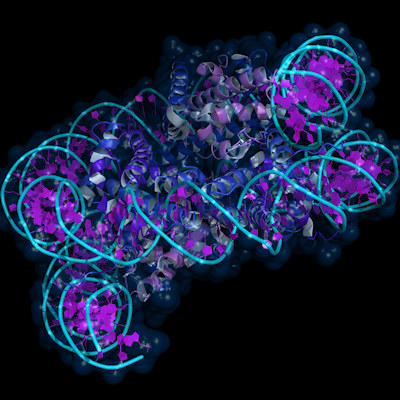June 22, 2021 -- A team of scientists has identified 71 new "imprinted" genes in the mouse genome. The new findings, published in Nature Communications on June 21, help uncover some of the scientific mysteries associated with epigenetics and point to how a parent's genes are uniquely turned off or on in their offspring.
Most of the 30 trillion cells in the human body contain genes that come from both their mother and father, with each parent contributing one version of each gene. The unique combination of genes contributes to making an individual distinct. Usually, each gene in a pair is equally active or inactive in a given cell.
This is not the case for imprinted genes. These genes are expressed from only one parental allele, determined by its parent of origin, and are thus imprinted. Imprinted genes also make up less than 1% of the total genes and tend to be more active (sometimes much more active) in one parental version than the other.
Before this research, scientists had documented around 130 imprinted genes in the mouse genome. Now, using a combination of allele-specific transcriptomics and uniparental DNA methylome profiling, researchers from the University of Bath and the University of Vienna have identified 71 genes that exhibit parent-of-origin-specific expression. This brings the total set of known imprinted genes to over 200.
Histone's new role in imprinting genes
It is well established that imprinting is associated with chromatin marks that include allele-specific DNA methylation. However, the switching on and off of imprinted genes is not always related to DNA methylation. The results of the study indicate that there is a greater contribution to imprinting made by histones, specifically the trimethylation of histone H3 lysine 27 (H3K27me3). These findings challenge the presumption that DNA methylation is the major switch for imprinted gene activity.
The data also show that H3K27me3- and DNA methylation-based imprinting mechanisms regulate partially overlapping gene sets in developing cells. This suggests that polycomb- (proteins responsible for chromatin remodeling of histones) and allele-specific DNA methylation machineries cooperate to control imprinted gene expression.
Whose genes get turned on?
Much of the gene on/off switching occurs during the formation of gametes (sperm and egg) but the precise mechanisms remain unclear. Therefore, the team of scientists from the University of Bath and the University of Vienna sought to determine parent-of-origin-specific expression in embryos and parent-of-origin-specific DNA methylation to characterize the imprinting landscape in mice.
The new study points to the possibility that some imprinted genes may not be marked in gametes but become active later in development or even in adulthood.
"Imprinting affects an important family of genes, with different implications for health and disease, so the seventy-plus new ones add an important piece of the jigsaw," said lead author Tony Perry, PhD, a professor in the department of biology & biochemistry at the University of Bath, in a statement.
Of the 71 novel imprinted genes, 56 were paternally expressed and 15 were maternally expressed. Reverse transcription polymerase chain reaction (RT-PCR) Sanger sequencing of independent crosses confirmed uniparental expression of paternally expressed genes, Pmaip1, Smyd2, Cblb, Myo1a, Sfxn1 and of the maternally expressed gene, Emc2.
If imprinting goes awry later in life, and the imprinted gene copy from one parent is switched on when it should be off (or vice versa), disease or death can occur. Faulty imprinted genes are associated with many diseases, including neurological and metabolic disorders and cancer.
"We may underestimate how important the relationship between imprinting and disease is, as well as the relationship of imprinting to the inheritance of parentally-acquired disease, such as obesity," Perry emphasized. "Hopefully, this improved picture of imprinting will increase our understanding of disease."
Do you have a unique perspective on your research related to epigenetics? Contact the editor today to learn more.
Copyright © 2021 scienceboard.net








